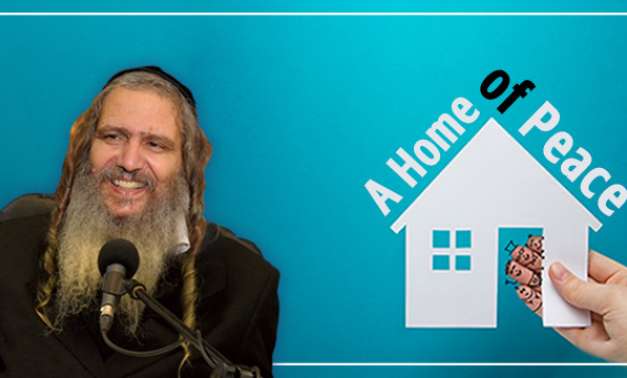
The Holy Celibate
Some young men think that they’re holy with all types of fasting and asceticism. But, if they haven’t yet married, they haven’t even started to serve Hashem…

Translated by Rabbi Lazer Brody
The Holy Celibate Shlit’a would quietly sit in the corner, learning day and night with no disturbance or interruption. He barely left the house of study. He limited his food intake to a few dry crusts of bread. Denying himself any semblance of bodily pleasure, he drank water from the tap, and slept on a hard wooden bench. Days, months, and years transpired in this manner, until the fateful day when the beadle found the elderly Holy Celibate Shlit’a lying lifelessly on the floor of the synagogue.
The entire village escorted the Holy Celibate Shlit’a on the way to his final resting place. They couldn’t find adequate words to express his holiness and asceticism. All the villagers were certain that such an individual, totally withdrawn and aloof from anything mundane, was surely a great tzaddik.
In fact, the Holy Celibate Shlit’a agreed with the villagers; he was sure that he was a tzaddik of lofty merits. As his soul ascended to the Heavenly Court, he was certain that he’d be greeted by an honor guard of history’s greatest tzaddikim playing lyres and cymbals, accompanied by a choir of archangels singing in six-part harmony. He was positive that they’d be escorting him to his rightful station beneath the Heavenly Throne to bask in the sublime light of The Divine Presence.
The Holy Celibate Shlit’a suffered a horrifying shock of disappointment. No souls of the great tzaddikim arrived to greet him. He didn’t hear any angels playing music in his honor. All he saw were the images of his parents and ancestors standing in front of him with dejected countenances. Without any further delay, he was ushered into the Heavenly courtroom, where he stood before a tribunal of very stern-looking tzaddikim.
The Chief Justice opened a large volume, the life story of the Holy Celibate Shlit’a. He reviewed all of the Holy Celibate Shlita’s mitzvot, and then addressed him by his first name, ignoring the dignified title of ‘Holy Celibate Shlit’a.’ The Chief Justice said: “Yosske, you learned quite a bit of Torah, you prayed, you made the necessary blessings, you put on tefillin daily, and you wore tzitzit. You observed the Sabbath and the holidays, and you fasted even more than required. In fact, you’ve done a good job of observing the mitzvot. There’s a problem though with all your good deeds – you didn’t complete the mission that you were supposed to complete in the physical world. You learned Torah, but you failed to implement what you learned. Had you married, you would have seen how far away you are from true Torah observance, for then, you would have had to invest much more effort to fulfill each mitzvah.”
Casting a chastising glance at the shocked soul of the Holy Celibate Shlit’a, the Chief Justice added: “Didn’t you know that the entire purpose of learning Torah was to acquire emuna? The level of emuna that you attained is extremely inadequate. Had you married, you’d have been required to face a long list of trials and tribulations with your wife. When she would have hindered your Torah learning with her various demands, you would have failed the tests. Whenever she would have belittled or scolded you, you’d have tarnished your soul with anger and complaining; only then, would you have seen how weak your emuna really is. You thought you trusted in Hashem, but if you’d been faced with the challenge of providing for a wife and children, you’d have seen just how frail your trust in Hashem really is. Every time you’d have been faced with a financial problem, you would have sunk into a state of depression and despair.”
The charges were getting more serious by the minute. But the Chief Justice hadn’t yet finished his admonishment of the Holy Celibate Shlit’a: “The minute you’d have earned some money, you’d have developed a lust for money; then, you would have forsaken the Torah while trying to make more money. Trust in Hashem? You were far away from trust. Patience? You never received a test of patience. Indeed, you are intrinsically full of anger and impatience. Good character? Had you married, you’d have seen just how much you really needed to improve, for you never had to compromise with, or to give in to, another person. Happiness? Maybe you see yourself as a happy person, but had you married, you would have seen how far you actually were from happiness, and even more, how difficult it would have been to make your wife happy, while listening to all of her daily demands, complaints, and problems. And furthermore…”
“…if Hashem would have desired that you only fulfill the mitzvoth between God and man, then He wouldn’t have sent your soul on a tour of duty to the lowly material world. Your mission down there was to arrive at the awareness of Hashem and to get to know Him; that can only be accomplished in the material world as a married man with all the relevant trials and tribulations…”
“…the Tribunal therefore concludes – in light of all the hard facts of your life – that you have failed to fulfill the vast majority of the mitzvoth between man and fellow man. You never gave of yourself to another person; you never sacrificed a thing for another person; nor have you ever surrendered your desires to the desires of another person. You have no idea about the meaning of compromise. You’ve done nothing to uproot or even mitigate your innate egotism.”
The Chief Justice and the Tribunal showed Yosske just how miserably he had failed. Yosske stood in front of the court, while the fires of humiliation scorched his soul. He had utterly failed to perform his tikkun. He was forced to realize just how badly he had failed to understand his task in the world by failing to take a wife. If only he’d have married and raised a family, while striving to build a peaceful home…
The above article is an excerpt from Rabbi Shalom Arush’s best-selling marital guide for men, The Garden of Peace
* * *
[1] Shlit’a is the Hebrew abbreviation for, "May he merit long and good days," and is used as a titular suffix to the names of leading scholars and rabbis. Here, Rav Arush’s intention is tongue-in-cheek.


 In his earliest days, The Holy Celibate Shlit’a
In his earliest days, The Holy Celibate Shlit’a




Tell us what you think!
Thank you for your comment!
It will be published after approval by the Editor.